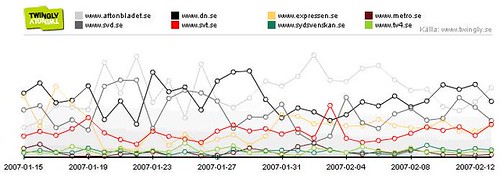Last week I compared three different tools for tracking blog links, Twingly, Technorati and Knuff. Twingly is a new service that for example the daily newspapers Dagens Nyheter and Svenska Dagbladet use to show most blogged articles.
Since Twingly was so new, my last post did not do the service justice. Primelabs, the company behind Twingly, now say that the numbers visible on DN.se should be more accurate. And a new search shows that Twingly tracks as many posts as Knuff.se, and far more than Technorati. The articles listed below are the five most blogged articles at DN.se as of yesterday.
Blogs posts tracked
| Article |
Twingly |
Technorati |
Knuff |
| “V försöker kringgå las” |
30 |
17 |
29 |
| “Lagrådet ger grönt ljus till avlyssning” |
25 |
13 |
27 |
| “Upphovsmän kan få jaga fildelare” |
35 |
28 |
35 |
| “Fortsatta turer kring Anna Nicole Smith” |
23 |
20 |
22 |
| “Arkeologer hittade 6.000 år gammal kram” |
21 |
8 |
11 |
Please note that these numbers only reflect links visible on DN.se. There could be links that Twingly track but are not publicly visible for one reason or another.
It would have been interesting to include Bloggportalen.se in the table above, but I have not found a way to easily calculate how many links there are to a specific article. Maybe Sigge can bring some light on the matter?
The introduction of blog tracking at DN.se and SVD.se has caused quite a stir in the Swedish blogosphere, and most bloggers support the initiative. Some raise concerns that bloggers will increase the number of links to Dagens Nyheter and Svenska Dagbladet in order to drive traffic to their blogs. I can’t see that this is neither surprising or very negative. Bloggers who’s main goal is to have a lot of visitors and be on top of different top lists will do whatever they can to add a few hundred readers to their stats. Others will manage their brand and build a reputation based on their integrity and link to these papers when they feel a need to do so, while refraining from doing it when it is not in line with the theme of their blog. None of these choices, or variations in between, are wrong in my view. These are just citizens that exercise their newfound rights to speak their mind. So instead of critizising bloggers who pimp for visitors, let’s rejoice at the fact that the leading newspapers of this country voluntarily invite YOU to be a part of the dissemination of news.
Maybe you’ve read Roger Enrico’s book “The Other Guy Blinked: How Pepsi Won the Cola Wars”, about how the invincible cola giant Coca-Cola was pressured into changing the formula to the much disliked new Coke, a gigantic fiasco. Well, I think you can look at the introduction of Twingly and similar services (like Aftonbladet/Bloggportalen) as a historic shift where media as the sole gatekeeper has become a thing of the past. With the introduction of blogs and other social media, resisting to invite readers/bloggers into the conversation in the end was meaningless. This is what we’ve been waiting for all along – the breaking up of MSM’s monopoly of news distribution. MSM blinked, in a positive manner of speaking. Sure, a lot of crap will float to the surface, but readers will learn over time where to go and who to skip (as they do when they read blogs in general), and Twingly’s ranking system might help bring the most relevant links to the top of the lists.
And regarding the supposed increase in links to DN and SVD, among the top blogged articles, a majority are from DN and SVD according to Knuff. But according to Twingly, there does not seem to be a huge increase in links to these two sites. So, no need for panic just yet.

